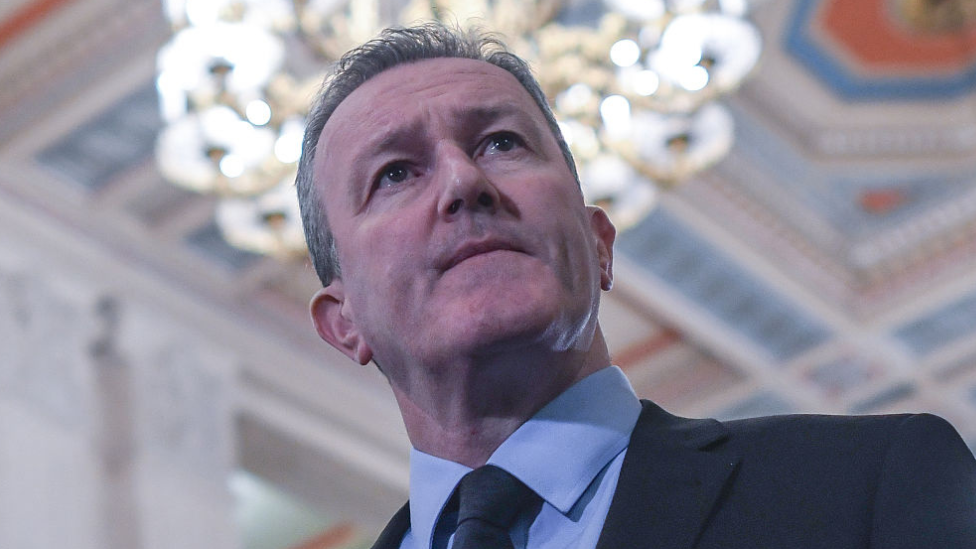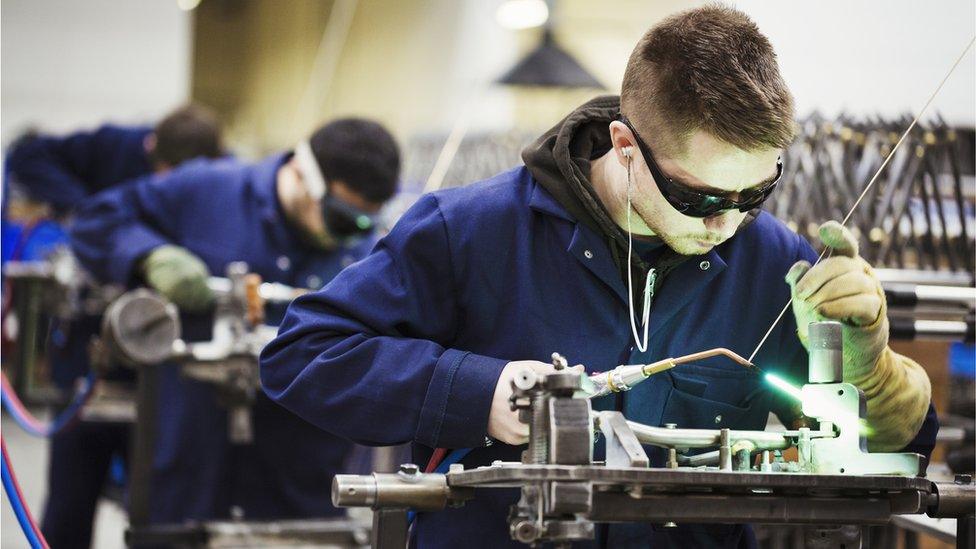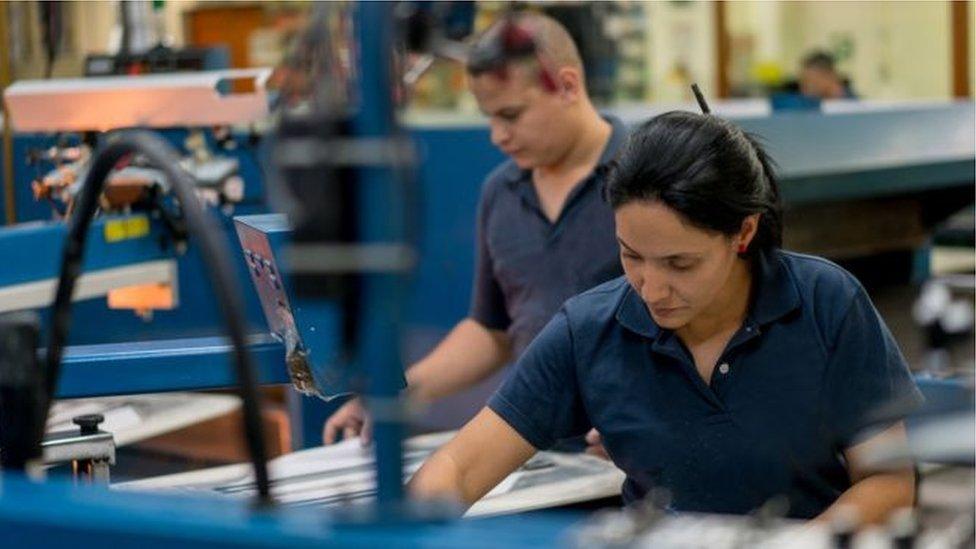Conor Murphy: Firms could face tougher rules to get public money
- Published
- comments

Sinn Féin's Conor Murphy outlined his vision for the Northern Ireland economy
International firms seeking public funding to invest in Northern Ireland could face tougher requirements under plans outlined by the economy minister.
Conor Murphy said the new conditions could include requiring firms to locate in disadvantaged areas.
Other criteria could be commitments to decarbonise their operations and recruiting people who want to get back into the workforce.
Invest NI is responsible for assessing and allocating grants to business.
The economic development agency, which is an arms-length body of the Department for the Economy, was the subject of a highly critical independent review last year.
The review raised questions about a central plank of Invest NI's support for businesses which is known as the "client company" model.
It said there were strengths to this model but it means that a sizeable amount of Invest NI's financial support was tied up in repeat assistance to a very small number of firms
Mr Murphy said: "Invest NI has many highly skilled and highly committed people, but as the Independent Review confirmed the organisation must restructure and refocus its activities if it is to be effective in the time ahead."
The other changes he has proposed include a new regional structure dedicated to home-grown small and medium sized firms and start-ups.
Mr Murphy said it should provide a similar service to that previously provided by the Local Enterprise Development Unit (LEDU) and that provided by Enterprise Ireland in the Republic of Ireland.
LEDU was absorbed into Invest NI in 2002.
Mr Murphy made his comments as he outlined a wider economic strategy to the Assembly.
It has four main areas of focus:
Increasing the proportion of workers in 'good jobs'
Promoting regional economic balance
Raising Northern Ireland's chronically low productivity
Reducing carbon emissions
Mr Murphy acknowledged that the devolved administration had a limited range of economic powers but said there were things the executive could do to make a difference.
He said: "Devolution provides significant control over business support, skills, innovation policy, and employment law.
"As a small region we are well placed to tailor support to local industries through partnership and co-design."
He did not commit to any specific targets at this stage, aside from the Executive's existing plan to reach net zero greenhouse gas emissions by 2050 at the latest.
Mr Murphy has also appointed four independent experts to advise on how his strategic objectives should be pursued, and also to help monitor progress.
They are Dr Lisa Wilson from the Nevin Economic Research Institute, Dr Conor Patterson from the Newry and Mourne Co-operative and Enterprise Agency, Dr David Jordan from the Productivity and Prof David Rooney from the Centre for Advanced Sustainable Energy.
Invest NI CEO Kieran Donoghue welcomed Mr Murphy's statement and said "the changes and increased efforts needed to reshape and reform Invest NI are already under way".
"For example, we have committed to increasing our regional presence and activity," Mr Donoghue said.
"And our Green Economy Development is also actively involved with the department to shape Northern Ireland's green investment proposition and help NI businesses to optimise the commercial opportunities emerging from the global drive to net zero."
Mr Donoghue offered his assurance that Invest NI would "fully support" delivery of Mr Murphy's economic vision.
The economy spokesperson from the opposition SDLP, Sinéad McLaughlin, said that while parts of the plan announced by Mr Murphy were welcome, it did not go far enough.
"Commitments have been made in previous visions, strategies and plans laid before the assembly and those commitments remain undelivered," she said.
"I was disappointed by the minister's refusal to support my proposal for legislation that would place binding obligations across government for regional economic balance."
Three big shocks
Over the course of almost a decade, the NI economy has been hit by three big external shocks: Brexit, the pandemic and energy price inflation.
In combination, these have hit business investment, political stability and consumer spending.
Given the relative fragility of the Northern Ireland economy it would have been unsurprising if the shocks had led to a deep recession with mass job losses and business failures.
That has not happened: the jobs market recovered strongly after the pandemic and unemployment has been below 3% for much of the last two years.

The employment rate measures the percentage of working-age adults who are in a job
Overall economic output has finally made up all the ground lost after the 2007 crash.
The official figures suggest Northern Ireland has had a much stronger post-pandemic recovery compared to the UK average: growth of 6.2% compared to 1.5%, up to the third quarter of last year.
A large part of that resilience will be down to the financial support provided by the UK government during the pandemic and the energy crisis - measures like the furlough and the energy price guarantee.
But there have been pockets of strength in the private sector, particularly in the services sector.
Services output is at an all-time high, led by the business services and finance subsector which was growing at an annualised rate of almost 9% in the middle of last year.
This probably reflects strong services exports from the "back offices" of global firms in Northern Ireland, as well as some locally-founded businesses doing similar work.
Poor productivity
However, on a longer view Northern Ireland has a very big economic problem - persistently weak productivity.
Productivity is a measurement of the amount of economic output generated by each worker.
In the long-term economic growth, higher wages and rising living standards are dependent on rising productivity.
The UK's productivity performance has been poor since the financial crisis in the late 2000s and Northern Ireland has consistently had the poorest performance of any UK region and is also far behind the Republic of Ireland.

The productivity gap between north and south has been widening for 20 years, according to researchers
The structure of Northern Ireland's economy, low levels of investment and geographical peripherality have all been suggested as important factors.
This problem has been subject to increased academic analysis, led by David Jordan and John Turner at Queen's University.
That work suggests two major areas of necessary improvement are education and skills, with poor management skills a particular concern.
Separate work by the Dublin-based Economic and Social Research Institute (ESRI) suggests almost all of the productivity gap between Northern Ireland and the Republic of Ireland can be explained by lower levels of investment and skilled workers in Northern Ireland.
The Queen's University research also found little proof that decades of government policies had done much to improve things.
Mr Murphy's speech comes as Finance Minister Caoimhe Archibald introduces the opening stages of the Budget Bill at Stormont.
On Thursday, Ms Archibald announced her public expenditure plan for the remaining financial year, external after the UK government allocated a £3.3bn package for the restored executive.
However, she said the package did not go far enough and called for an "urgent meeting" with the Treasury.
Related topics
- Published16 January 2024

- Published14 December 2023

- Published18 November 2021

- Published28 November 2022
